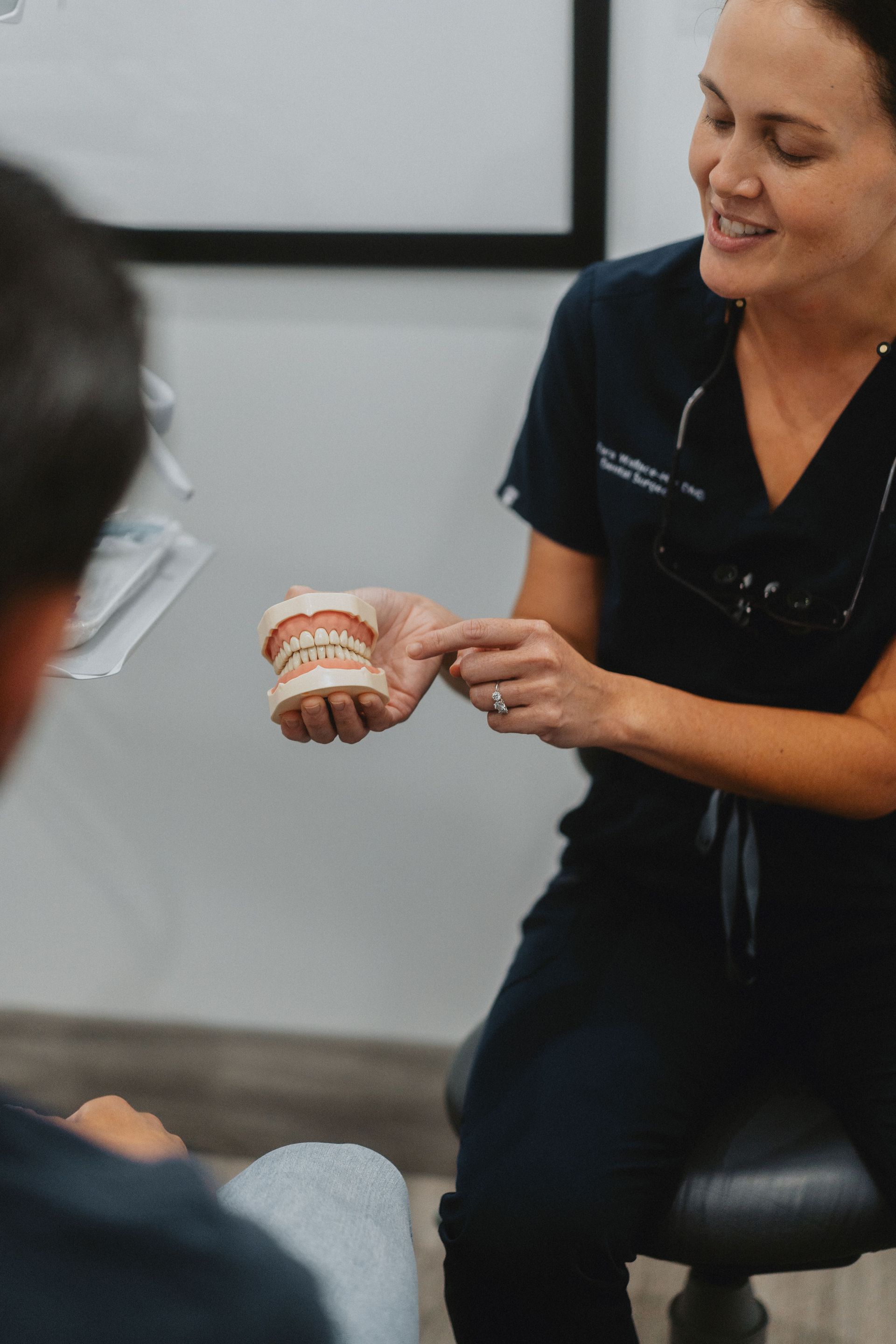Managing Teeth Grinding & Sleep Apnoea
Teeth grinding and sleep disturbances can have an impact on daily comfort, affecting the jaw, teeth, and quality of sleep. Many people experience bruxism (teeth grinding) without realising it, often waking up with jaw tension or noticing worn teeth over time.
Similarly, sleep apnoea is a health condition that affects quality of sleep. It can cause breathing interruptions during sleep, leading to fatigue, disrupted rest, impaired concentration and an increased risk of serious health issues. This condition is often undiagnosed, making awareness and understanding crucial for proper management and treatment. It may be linked to stress, misalignment, or airway obstruction, making a professional assessment important for identifying potential treatment options.
Diagnosis and Treatment Options
Diagnosing sleep apnoea involves a thorough evaluation, including a review of medical history and a physical examination. These help in identifying the severity of the condition and the most appropriate treatment path. Treatment options vary from lifestyle changes, such as weight management, to sleep apnoea devices.
How We Can Help
At New Leaf Dentists, we understand the complexities of sleep apnoea and the impact it can have on one's health and quality of life. We provide customised sleep apnoea devices for managing this condition. Our commitment is to provide our patients with comprehensive care that addresses their specific needs on the Central Coast.
Solutions For Teeth Grinding & Sleep Apnoea
Each case of teeth grinding or sleep apnoea is unique, requiring a personalised approach. Treatment may involve custom-fitted dental appliances, which can help address issues related to nighttime teeth clenching or airway obstruction. Unlike over-the-counter options, these appliances are specifically designed based on digital scans and impressions, ensuring a precise fit tailored to the individual's jaw structure and breathing patterns.
For sleep apnoea, oral appliances are designed to gently reposition the lower jaw, helping to keep the airway open during sleep. This can assist in reducing airway obstruction, which is a common cause of interrupted breathing during the night. These devices may be considered an alternative to CPAP machines for certain cases of mild to moderate sleep apnoea.
For teeth grinding (bruxism), custom-made occlusal splints create a protective barrier between the upper and lower teeth, reducing excessive wear and potential strain on the jaw. Wearing a splint at night may help manage the effects of grinding and prevent further damage to the teeth over time.
A consultation can help determine the most suitable approach for managing sleep-related conditions and jaw function concerns. To learn more about available options, call New Leaf Dentists on
(02) 4367 6222 or contact us
here.
Signs Of Grinding & Sleep Apnoea
Signs that may indicate bruxism or sleep apnoea include:
- Jaw pain, facial tension, or frequent headaches
- Worn, chipped, or sensitive teeth
- Interrupted sleep or difficulty breathing at night
- Snoring or excessive daytime tiredness
A professional assessment can help determine the best approach to managing these concerns. Regular evaluations ensure that any prescribed dental device remains effective over time.
To learn more or schedule an appointment, give us a call or contact us here.
Please note: Any surgical or invasive procedure carries risks. Before proceeding, you should seek a second opinion from an appropriately qualified health practitioner.
Frequently Asked Questions
What is Bruxism?
Bruxism is another term for habitual teeth grinding and clenching, which can happen while awake or asleep. It does not always require treatment (roughly a third of the population grinds their teeth to some degree), but it can still cause significant damage. If left unaddressed, worsening bruxism can result in structural issues among your teeth – this can extend to restorations and dentures too.
What are some causes and symptoms of teeth grinding (Bruxism)?
Waking bruxism is primarily caused by stress or frustration, while sleep disorders such as sleep apnoea may result in sleeping bruxism. If you grind your teeth, then your teeth might slowly become fractured or loose. On top of this, the teeth will become more sensitive, and your jaw muscles are more likely to ache. Sleep bruxism may even be loud enough to disrupt your partner’s rest.
What is TMJ?
TMJ refers to a wide variety of disorders of the temporomandibular joint. This connects the jaw to the skull, so problems with it can seriously get in the way of eating and even speaking. Roughly 1 in 10 of us will contend with these issues in our lifetime – this can go away after a short time, but you might require dental intervention if it does not.
What are some causes and symptoms of TMJ?
There is no one cause for TMJ, but teeth grinding is a major contributor. General jaw issues and even injuries similarly lead to TMJ troubles – even frequently chewing gum can be a risk factor. TMJ can lead to tenderness and pain in the jaw, as well as the jaw itself locking. In some cases, dentists use an occlusal splint moulded to your teeth to provide relief.
What are the signs and symptoms of sleep apnoea?
The most common signs of sleep apnoea include loud snoring, observed episodes of stopped breathing during sleep, abrupt awakenings with gasping or choking, morning headaches and night-time sweating. Recognising these symptoms is the first step towards diagnosis and treatment. Consult with us if you or someone you know is experiencing these symptoms, as untreated sleep apnoea can lead to more serious health complications.
Can sleep apnoea affect my oral health?
Yes, sleep apnoea can have several implications for oral health. Individuals with sleep apnoea may experience dry mouth, which can increase the risk of cavities and gum disease due to reduced saliva flow.
How does an oral appliance for sleep apnoea work?
Oral appliances for sleep apnoea work by repositioning the jaw or tongue to keep the airway open during sleep. These devices are custom-fitted to the individual's mouth. By preventing the airway from collapsing, oral appliances reduce the frequency of breathing interruptions and snoring.
Is an oral appliance the right choice for me?
Determining whether an oral appliance is the right choice involves a comprehensive evaluation. This typically includes an assessment of your sleep apnoea severity, jaw structure, dental health and overall health, while liaising with your GP. Oral appliances are often recommended for patients with mild to moderate obstructive sleep apnoea. However, the treatment approach should always be decided after a thorough consultation with healthcare professionals and dentists.














